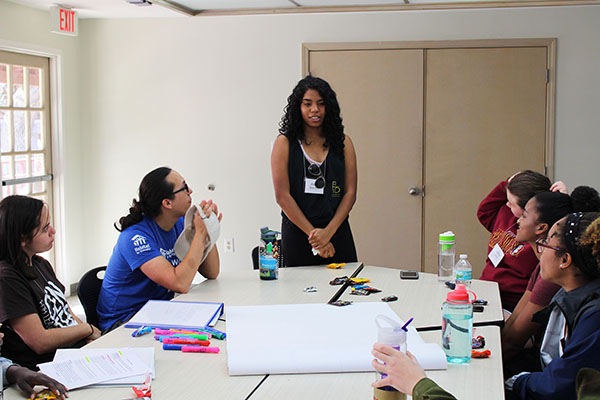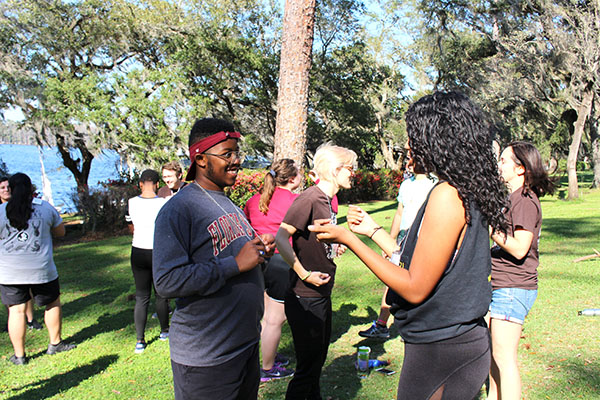FSU students learn leadership outdoors
There’s nothing quite like roughing it in nature with a group of strangers to learn about leadership.
That’s what Florida State students discovered this weekend at the first 2018 session of Leadership Learning in the Outdoors for Group and Individual Change, better known as Leadership LOGIC. The overnight leadership development program at the Rez facilitates leadership theory learning through outdoor hands-on exercises.

Photo/ Rachel Mulcahy
The introductory program provides students a foundational level of leadership learning in hopes of motivating them to learn more about how they can be effective leaders in their communities and personal lives.
Jenna Volpe is one such motivated student leader. The senior Recreation,Tourism and Events major serves as one of the Leadership LOGIC student coordinators. Volpe was a previous student participant, and driven by the program’s impact on her understanding of leadership, she decided to continue her leadership learning and development in this new role.
“When I was a participant in LOGIC I learned a lot about leadership, and I was able see other aspects of leadership that I didn’t know about before,” Volpe said. “As a coordinator, leadership means setting a positive example by getting others motivated towards the same cause and getting others excited to create social change.”

LOGIC. Photo/ Rachel Mulcahy
Volpe cites the atmosphere of building connections as one of her favorite parts of LOGIC.
“What I love most about this experience is that these 20 people would never have met if not for this program,” Volpe said. “But here we provide an overnight experience where we get to team build, learn about leadership, and create bonds with people we wouldn’t have met otherwise.”
Bailey Albrecht, who coordinates leadership programs at the Center for Leadership & Social Change, also highlighted the importance and uniqueness of meeting new people through LOGIC.
“Usually you engage with leadership in a group of people that you know,” Albrecht said. “It’s not everyday that you come into a program and work with a group of random strangers on team building and leadership development.”
Participant Maria Pastor, an international student from Spain, is a clear example of how LOGIC connects an unlikely group of students to one another. During this first semester abroad at Florida State, Pastor registered for the program in hopes of making connections and learning more about her personal leadership style.
After engaging in some icebreakers, Pastor was eager to get started in the activities of the weekend.
“Everyone has been so nice here already,” Pastor said, “I’m excited to meet new people and to gain more confidence in myself through this experience.”

getting-to-know-you questions as LOGIC kicks off outside. Photo/
Rachel Mulcahy
Albrecht believes the program’s uncommon focus on the outdoor engagement of leadership is what sets this experience apart.
“The great thing about this program is that it truly prompts leadership theory-to-practice while being outdoors,” Albrecht says, “Students get to engage with leadership theory through team-building and learning in the woods.”
While the outdoor approach is rare to find in leadership programs, the goal for participants to leave with a newfound understanding of leadership remains strong.
“The main thing I am hoping students takeaway from LOGIC is that there are different ways to engage in leadership,” Albrecht said. “While teaching leadership theory we want students to think about the things they want to accomplish. We want them to question: Well, how can I actually do this?”
—Talise Burton

